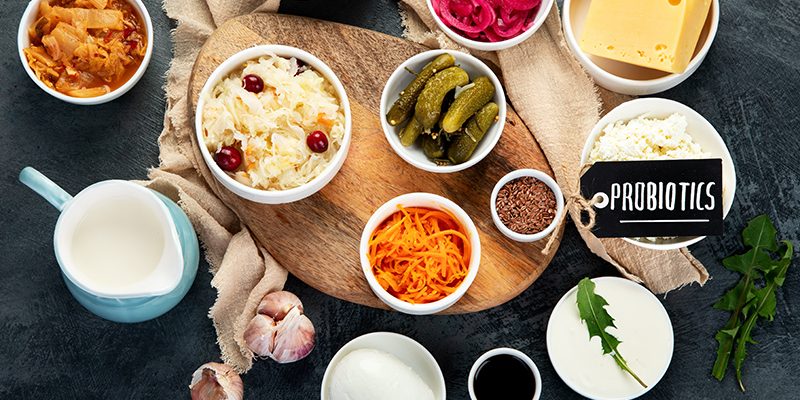What are probiotics?
Probiotics are friendly microorganisms that play a crucial role in supporting the immune and digestive systems. These beneficial bacteria help regulate our digestive health and strengthen the overall immune response. Probiotics have a wide variety of proven health benefits and are essential for maintaining a balanced gut microbiome.
What are the benefits of probiotics?
The advantages of incorporating probiotics into your diet are extensive:
- Balancing Gut Flora: Probiotics support the formation and balancing of beneficial bacteria within the digestive system, which is essential for proper digestion and nutrient absorption.
- Preventing Diarrhoea: Probiotics can help prevent diarrhoea, particularly in situations like antibiotic use or gastroenteritis.
- Enhancing Mental Health: Recent studies suggest that probiotics may have positive effects on mental health, potentially alleviating symptoms of anxiety and depression.
- Supporting Skin Health: Probiotics may help reduce the severity of allergic reactions and skin conditions, such as eczema.
Historically, probiotics were recognised thousands of years ago, with references to their health benefits dating back to the times of the Ancient Greek and Roman empires. The discovery of living beneficial bacteria in yogurt by Nobel Prize-winning researcher Élie Metchnikoff in 1908 further highlighted their importance in promoting health.
What foods contain probiotics?
Probiotics are naturally present in various foods, making it easy to incorporate them into your diet. Rich sources of probiotics include:
Dairy Products:
- Yogurt: Contains active cultures that support gut health.
- Kefir: A fermented milk drink, loaded with beneficial bacteria.
Fermented Foods:
- Sauerkraut and Kimchi: Fermented vegetables that are rich in probiotics.
- Pickles: Naturally fermented varieties provide health benefits.
Certain Cheeses:
- Cheddar, mozzarella and gouda are examples of cheeses that may contain probiotics.
Incorporating these foods into your daily meals can help increase your intake of beneficial probiotics, contributing to improved digestive health.
What are prebiotics?
While probiotics are essential, it is also important to understand their counterpart: prebiotics. Prebiotics are non-digestible food components that support the growth and activity of probiotics. They are typically fibrous carbohydrates that provide nourishment for probiotic bacteria.
Common Sources of Prebiotics:
- Vegetables: Leeks, yams, okra, artichokes, celery, tomatoes, onions and garlic.
- Legumes: Beans, lentils, peas and chickpeas.
- Whole Grains: Whole wheat, oats, buckwheat, barley and brown rice.
- Nuts and Seeds: Walnuts, hazelnuts, almonds and flax seeds.
- Fruits: Bananas, grapes, strawberries, apples and olives.
Incorporating prebiotic-rich foods into your diet can enhance the effectiveness of probiotics, creating a more beneficial gut environment.
The Importance of Probiotics and Prebiotics
Probiotics are essential for maintaining a healthy digestive system and a robust immune response. While naturally present in the body, obtaining probiotics through diet or probiotic supplements can provide significant health benefits. Additionally, supporting these probiotics with prebiotic-rich foods enhances their efficacy, enabling a healthy gut microbiome.
While multivitamins can offer valuable support for overall health, it is essential to recognize that a balanced diet should remain the cornerstone of nutritional well-being. Multivitamins are intended to be a complementary measure and should not be considered a substitute for a diverse and nutritious food intake.
Note: It is strongly advised that individuals consult a healthcare professional prior to initiating any supplement, particularly if they have existing health conditions, are taking prescribed medications, or are pregnant.

